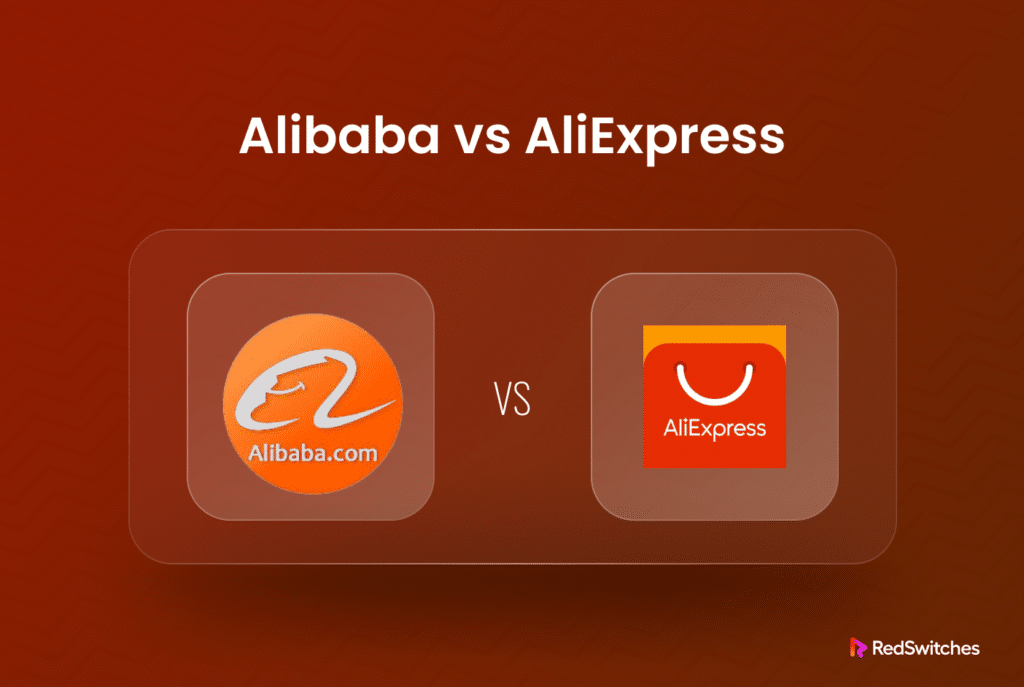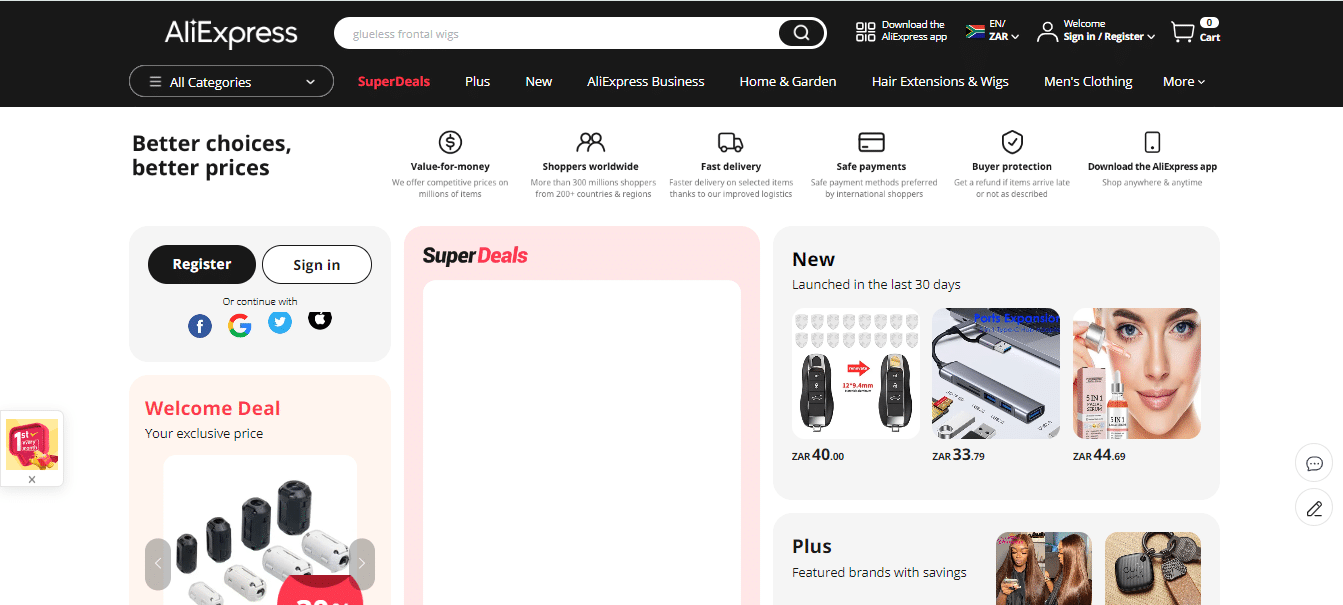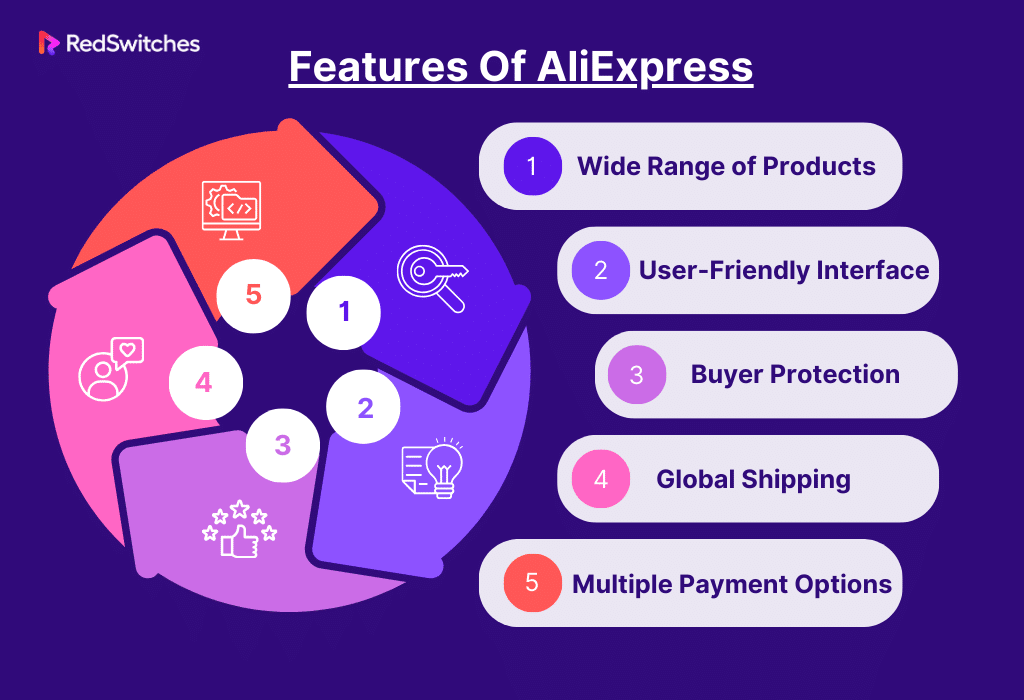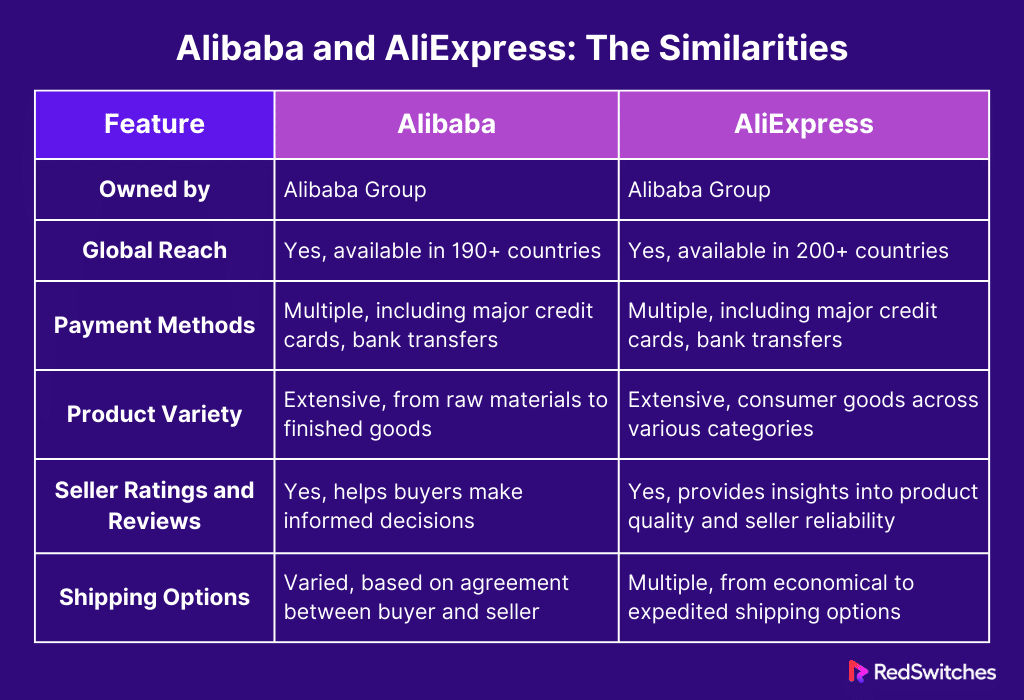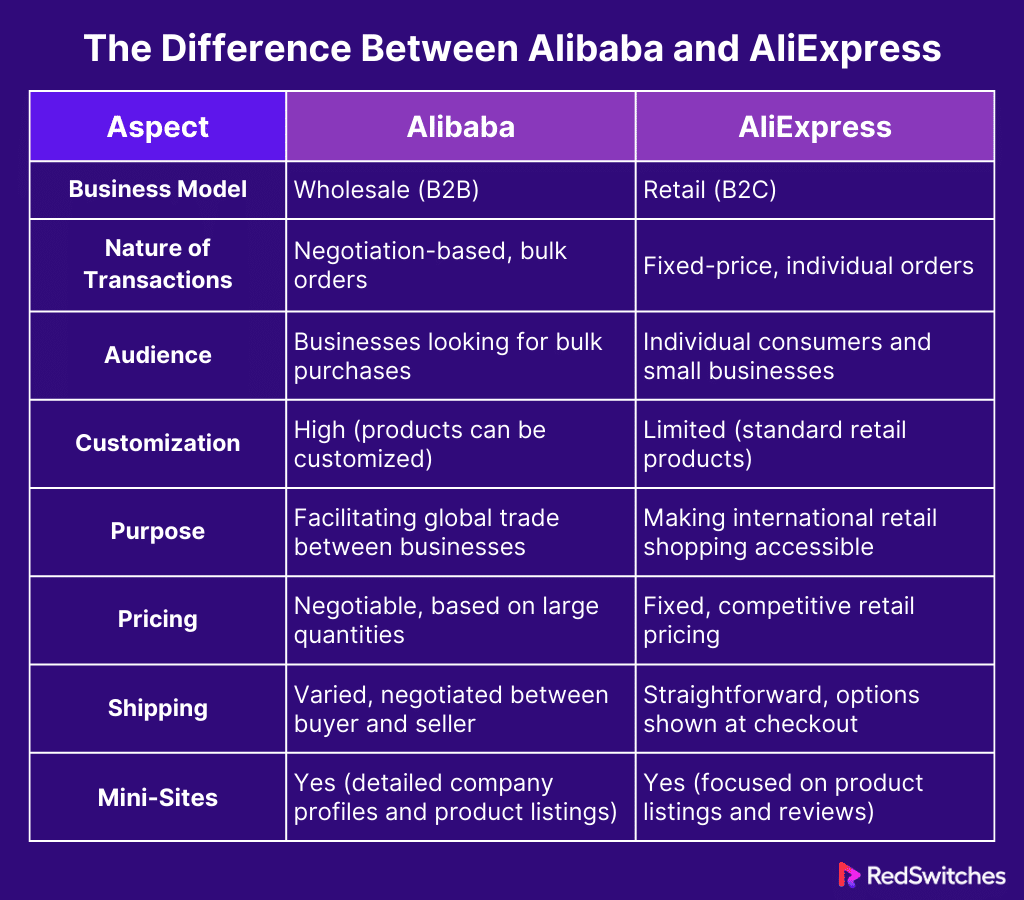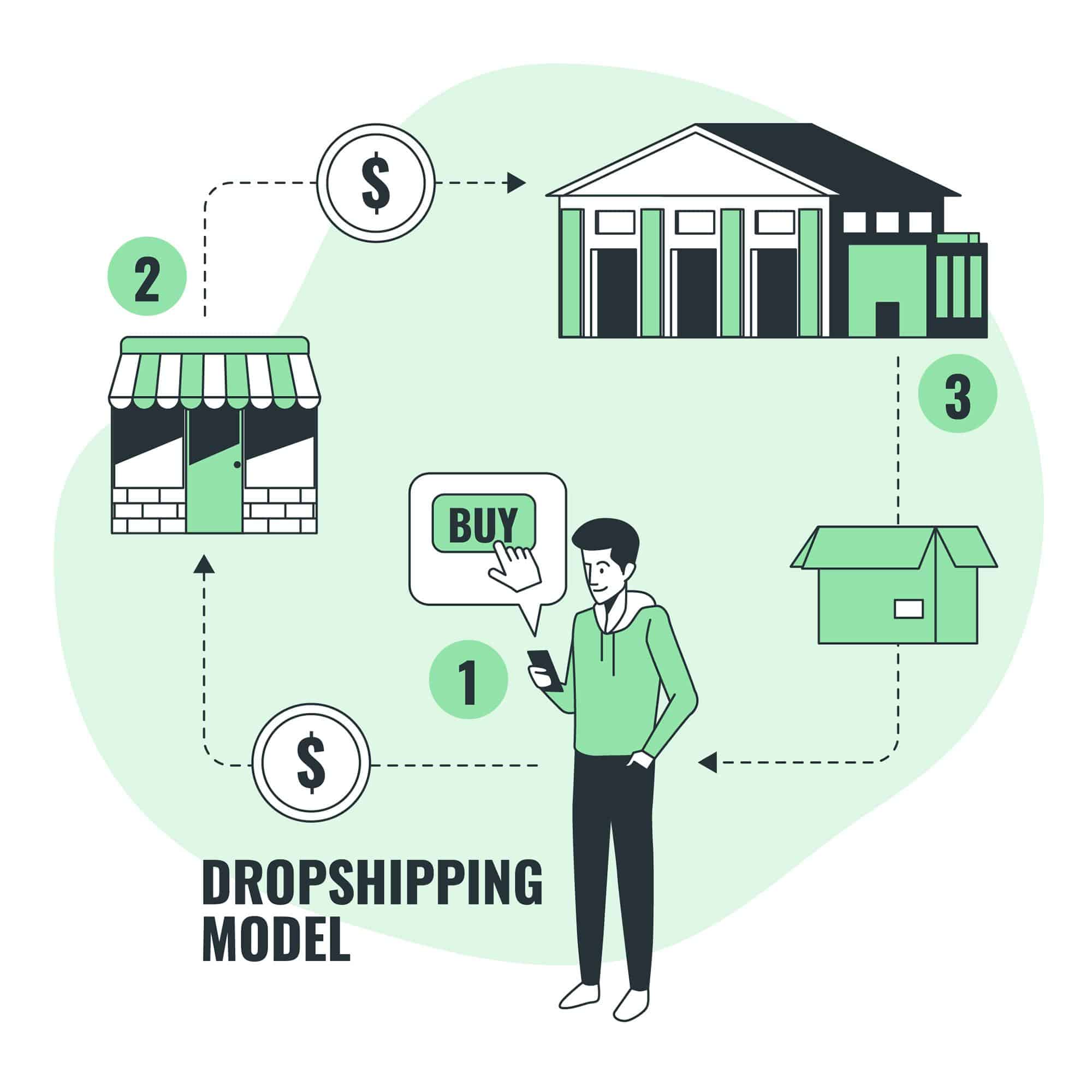Key Takeaways
- Alibaba focuses on B2B transactions, offering bulk purchases and customization, which is ideal for businesses.
- AliExpress caters to B2C transactions, perfect for individual consumers and small businesses. It offers a wide range of products with no minimum order requirements.
- Both platforms are owned by Alibaba Group, expanding their e-commerce and online retail reach globally.
- Alibaba and AliExpress support various payment methods and offer various products catering to different markets and consumer needs.
- Seller ratings and reviews are crucial on both platforms, guiding buyers towards reliable sellers and quality products.
- Shipping options vary between Alibaba (negotiated for bulk orders) and AliExpress (consumer-friendly, with options shown at checkout).
- Alibaba allows for significant product customization, benefiting businesses looking to brand products uniquely.
- AliExpress offers a more straightforward purchasing process with fixed prices and is suitable for testing the market or starting small.
- The choice between Alibaba and AliExpress for dropshipping depends on the need for bulk orders, customization, and shipping speed.
- Alibaba is preferred for private labeling, customization, and bulk orders, while AliExpress suits those with limited budgets or smaller-scale operations.
In the bustling world of e-commerce, two giants stand tall: Alibaba and AliExpress. Each platform serves a unique purpose in the digital marketplace, but how do they differ, and what makes each one stand out?
Alibaba, the renowned B2B portal, has been a powerhouse in China’s e-commerce sector for over two decades. In 2022, it claimed nearly a quarter of the global e-commerce market.
Conversely, AliExpress, known for its B2C offerings, has become a go-to for international consumers seeking diverse products. With a strategy to expand its cross-border clientele to 30 million by 2030, AliExpress is not just a marketplace; it’s a phenomenon.
When choosing between Alibaba and AliExpress for e-commerce, consider the role of a dedicated server in managing high-traffic volumes.
As we delve into the Alibaba vs AliExpress debate, we’ll explore how these platforms cater to different audiences, their impact on global trade, and what the future holds for e-commerce. Join us as we navigate the intricate e-commerce landscape, where the battle of Alibaba vs AliExpress is more than just a competition—it’s a look into the future of global commerce.
Table of Contents
- Key Takeaways
- What is Alibaba?
- What is AliExpress?
- Alibaba and AliExpress: The Similarities
- The Difference Between Alibaba and AliExpress
- Alibaba vs AliExpress for Dropshipping 2024
- Alibaba vs AliExpress for Private Labeling
- Conclusion
- FAQs
What is Alibaba?
Credits: Alibaba
Alibaba is a global online marketplace. It focuses on business-to-business (B2B) transactions. Jack Ma founded it in 1999 in China. The platform connects businesses worldwide. These businesses can buy and sell goods in bulk. It is ideal for manufacturers, wholesalers, and retailers. They use it to find large quantities of products. Alibaba is a key player in global trade. It helps millions of suppliers and buyers make transactions.
With its focus on B2B transactions, Alibaba may require a dedicated server for businesses looking to handle large-scale operations efficiently.
Features Of Alibaba
Alibaba, a titan in the e-commerce world, offers a suite of features to facilitate B2B transactions. Here’s an analysis of what Alibaba brings to the table:
Store Front and Catalog
Alibaba allows businesses to create a storefront and catalog. This showcases their products and brand to potential buyers worldwide. A well-designed storefront can help build trust and credibility with buyers.
Communication Tools
Effective communication is crucial for Alibaba. The platform provides tools that allow buyers and sellers to negotiate deals, discuss product details, and build relationships. Translation tools help break down language barriers, making transactions smoother.
Ads and Lead Generation
Alibaba’s marketing tools can increase businesses’ visibility. Features like product showcases and keyword advertising help attract buyers, which means businesses can reach more potential customers and increase sales.
Analytics
The platform offers analytics to help sellers understand their store’s performance. This data is valuable for making informed decisions to grow the business.
Order Management
Alibaba simplifies order management. Everything can be handled in one place, from shopping to payments and logistics, making the process efficient for sellers.
Also Read Everything About eCommerce Dropshipping.
How does Alibaba work?
Alibaba operates as a global wholesale marketplace, connecting buyers with suppliers. This is to facilitate bulk purchases at competitive prices. Here’s a breakdown of how it works:
For Buyers
- Register and Search: Buyers start by registering for a free account. They can then search for products using various filters to meet their needs.
- Negotiate and Purchase: Buyers can contact sellers to negotiate terms, prices, and customization options. Once terms are agreed upon, they can place their orders.
- Payment and Shipping: Alibaba offers secure payment options. Buyers can choose shipping methods based on speed, cost, and preference.
For Sellers
- Register and Set Up: Sellers must create an account and set up their storefront. This involves adding product details, images, and information about the business.
- Receive Inquiries: Sellers will receive inquiries from potential buyers. Quick and professional responses can turn these inquiries into sales.
- Order Fulfillment: After closing a deal, sellers manage the order’s production, packaging, and shipping. Alibaba provides tools and services to assist with these steps.
In the Alibaba vs AliExpress comparison, Alibaba caters to a different market than AliExpress, designed for B2C transactions. Understanding these platforms’ distinct features and workings can help businesses and individuals navigate the e-commerce landscape more effectively.
What is AliExpress?
Credits: AliExpress
AliExpress is an online retail service from China. It is part of the Alibaba Group and started in 2010. The service lets small businesses and individuals buy in smaller quantities. AliExpress is a global platform that serves consumers directly. The platform offers products in electronics, fashion, home goods, and more. Unlike Alibaba’s B2B focus, AliExpress focuses on B2C transactions, making it easy for individual shoppers to find what they need.
AliExpress, catering to B2C customers, might not necessitate a dedicated server for individual sellers due to its optimized platform for smaller transactions.
Features Of AliExpress
AliExpress stands out in e-commerce with its distinctive features tailored for international buyers. Here’s what makes AliExpress unique:
Wide Range of Products
AliExpress offers an extensive selection of products, making it a one-stop shop for consumers worldwide. From trendy clothing to the latest gadgets, you can find almost everything.
User-Friendly Interface
The platform is designed to be easy to navigate, ensuring a pleasant shopping experience. Users can easily search for products, read reviews, and compare prices.
Buyer Protection
AliExpress provides a comprehensive buyer protection program that includes a full refund if products are not as described or if they don’t arrive within the promised time frame.
Multiple Payment Options
Shoppers on AliExpress can choose from various payment methods, making purchases convenient and secure.
Global Shipping
AliExpress ships to over 200 countries and regions, offering different shipping options to meet the needs of its global customer base.
How does AliExpress Work?
AliExpress operates as a global online retail service. It provides a platform where buyers worldwide can purchase items directly from sellers, mainly in China. Here’s a simple breakdown of its workings:
For Consumers
- Browse and Discover: Shoppers start by browsing through the vast selection of products available on AliExpress. They can use filters to narrow down their search according to their preferences.
- Make a Purchase: Once they find a product they like, they can easily place an order by adding the item to their cart and proceeding to checkout. Here, they can choose their preferred payment method.
- Track and Receive: After making a purchase, buyers can track their order through the platform until it’s delivered to their doorstep. The process is streamlined and user-friendly, offering shoppers peace of mind.
For Sellers
- Register and List Products: Sellers on AliExpress need to register for an account and list their products along with detailed descriptions, pricing, and shipping information.
- Receive Orders: Sellers will receive orders from buyers, which they must fulfill promptly. Prompt responses to buyer inquiries and efficient handling of orders can lead to higher seller ratings.
- Ship and Manage: Sellers are responsible for shipping the products to the buyers. AliExpress offers tools and services to help sellers manage orders and track shipments.
When comparing Alibaba vs AliExpress, it’s clear that while they are part of the same company, they serve different markets and have unique operational models.
Alibaba is tailored towards larger businesses looking for wholesale buying options, whereas AliExpress caters to individual consumers and small businesses seeking to purchase smaller quantities of goods. A dedicated server becomes crucial when scaling operations on Alibaba, ensuring seamless connectivity and transactions.
This distinction is crucial for users to understand so they can choose the platform that best suits their needs, whether they’re looking to bulk buy for a business or shop for personal items.
Also Read 11 Best Dropshipping Web in 2024.
Alibaba and AliExpress: The Similarities
Both Alibaba and AliExpress have become pillars in the global e-commerce landscape. Despite their distinct business models, they share several key similarities that contribute to their widespread success.
Owned by Alibaba Group
Let’s explore how the Alibaba vs AliExpress comparison reveals their shared foundation under the Alibaba Group umbrella.
At the core, both Alibaba and AliExpress are integral parts of the Alibaba Group’s vast e-commerce empire. Founded by Jack Ma and his team in 1999, the Alibaba Group has expanded far beyond its original B2B marketplace to include a diverse range of services, including cloud computing, digital media, and entertainment.
However, the company has made its mark globally in online retail and e-commerce. By operating both platforms under its umbrella, Alibaba Group has effectively catered to a broad spectrum of users—from large-scale businesses and manufacturers to individual consumers and small businesses looking for retail goods.
Global Reach
Credits: Freepik
To understand their expansive global footprint, let’s understand the Alibaba vs AliExpress dynamics.
One of the most striking similarities between Alibaba and AliExpress is their impressive global reach. Both platforms have pushed beyond the boundaries of traditional e-commerce, connecting sellers with buyers across the globe.
With its B2B model, Alibaba has become a go-to source for businesses worldwide looking to source products directly from manufacturers and wholesalers. On the other hand, AliExpress has opened up a vast marketplace for consumers worldwide, offering a wide array of products that can be shipped to over 200 countries and regions.
This global reach is supported by a robust logistics and supply chain network, enabling efficient and relatively swift shipping of products across borders. Furthermore, both platforms have taken steps to accommodate users from different linguistic and cultural backgrounds. Multi-language support and the ability to convert prices into various currencies enhance the user experience, making it easier for people worldwide to shop and sell.
Payment Methods
We’re delving into Alibaba vs AliExpress to uncover the various payment methods they both support. Utilizing a dedicated server can enhance the security of transactions on Alibaba, a key concern for wholesale buyers and sellers.
Both platforms support various payment methods to cater to their global audience. Secure transactions are a top priority, ensuring buyers can shop with confidence. Alibaba and AliExpress accept major credit cards, bank transfers, and mobile payment systems. This flexibility in payment options underscores their commitment to accessibility and convenience for users worldwide. The secure payment systems facilitate smooth transactions and build trust between buyers and sellers across different countries.
Product Variety
Alibaba and AliExpress are unmatched when it comes to product variety. Alibaba’s vast B2B marketplace is teeming with products ranging from raw materials to finished goods across various industries. This diversity makes it an invaluable resource for businesses looking to source products in bulk.
On the other hand, AliExpress offers an extensive range of consumer products, from fashion and electronics to home goods and beyond, catering to the individual needs of consumers around the globe. The broad product variety on both platforms ensures you can find almost anything you need, whether a business or a consumer.
Seller Ratings and Reviews
Credits: Freepik
Seller ratings and reviews play a critical role in both Alibaba and AliExpress. These features help buyers make informed decisions by providing insights into the seller’s reliability and the quality of their products. On Alibaba, where transactions are typically larger, ratings and reviews can guide businesses in choosing the right suppliers.
Similarly, on AliExpress, where consumers shop for personal items, reviews and ratings offer a way to gauge product quality and seller trustworthiness before purchasing. This feedback system enhances the shopping experience and fosters community and trust among platform users.
Shipping Options
Shipping is another area where Alibaba and AliExpress excel. Both platforms offer various shipping options to meet different needs and budgets. Given the bulk of purchases on Alibaba, shipping terms are often negotiated between the buyer and seller.
AliExpress, catering to consumer purchases, typically offers a range of shipping methods, from economical options to expedited shipping, allowing buyers to choose based on their urgency and budget. The platforms’ global logistics networks ensure that products can be delivered to buyers worldwide, making international trade more accessible.
Alibaba and AliExpress’s payment methods, product variety, seller ratings and reviews, and shipping options highlight their commitment to providing a seamless and trustworthy e-commerce experience. By addressing the needs of both businesses and consumers, these platforms play a pivotal role in the global e-commerce ecosystem, making it easier for people to connect, shop, and sell in the digital age.
Also Read 20 Best eCommerce Websites Ruling the 2024 Marketplace
The Difference Between Alibaba and AliExpress
Alibaba and AliExpress, pillars of the global e-commerce landscape under Alibaba Group, cater to different market segments through distinct business models and transaction natures. Understanding these differences is crucial for buyers and sellers to choose the platform that best suits their needs.
Business Model: Wholesale vs. Retail
Let’s break down the Alibaba vs AliExpress difference to spotlight their distinct business models: wholesale vs. retail.
Alibaba: The Wholesale Giant
Alibaba operates on a business-to-business (B2B) model. It’s a platform for wholesale transactions, connecting manufacturers, distributors, and businesses worldwide. The essence of Alibaba’s model is bulk purchasing. This model benefits businesses looking to source large quantities of goods at competitive prices. Alibaba’s platform is tailored for businesses aiming to resell products in their local markets or use these goods as components in manufacturing processes.
AliExpress: The Retail Marketplace
Contrastingly, AliExpress follows a business-to-consumer (B2C) and, to a lesser extent, consumer-to-consumer (C2C) model. It’s a retail platform where smaller sellers can offer products to international customers without requiring buyers to purchase in bulk. AliExpress is ideal for consumers looking for a wide range of products at competitive retail prices. From fashion to electronics, AliExpress offers accessibility and variety akin to a global online retail store.
Nature of Transactions
Highlighting the Alibaba vs AliExpress distinction through the lens of their transaction nature.
Transactional Dynamics on Alibaba
Transactions on Alibaba are characterized by negotiation. Since it’s a wholesale marketplace, buyers and sellers often discuss prices, minimum order quantities (MOQs), customization options, and shipping terms. This negotiation process is vital, allowing for tailored deals that meet both parties’ needs. The platform facilitates these interactions with tools to support communication, price quotes, and secure transactions.
Retail Transactions on AliExpress
AliExpress transactions are straightforward and resemble those on other retail e-commerce websites. Consumers browse the platform, select products, and purchase them at listed prices. There’s no need for negotiation as products are sold at fixed retail prices. The simplicity of this model appeals to individual shoppers looking for an easy and direct shopping experience. AliExpress enhances this process with buyer protection policies, ensuring a safe and reliable transaction environment. On AliExpress, where transactions are direct and quick, the reliance on a dedicated server might be less, but still beneficial for top sellers.
Also Read Shopify vs WordPress 2024 Analysis: 12 Key Differences
Audience
Now, we’ll analyze the Alibaba vs AliExpress platforms to differentiate the audiences they target.
Alibaba’s Target Audience: Business Buyers
Alibaba specifically caters to a business audience. This includes small to large enterprises looking to source products in bulk directly from manufacturers or wholesalers. The platform bridges these transactions, allowing businesses from various sectors to find suppliers that meet their specific needs. The typical Alibaba user is a business owner or a procurement officer knowledgeable about bulk purchasing and international trade laws.
AliExpress’s Consumer Focus
In contrast, AliExpress targets individual consumers and small businesses that do not require large quantities of goods. It’s designed for retail shopping, providing access to a vast range of products at retail rather than wholesale prices. The platform is ideal for the everyday shopper looking for affordable items, from fashion and tech gadgets to home goods. AliExpress also attracts small retailers and dropshippers who wish to purchase items in smaller quantities.
Customization
Discuss the Alibaba vs AliExpress platforms in terms of the customization options they offer users.
Customization on Alibaba
One of the key features of Alibaba is the ability to customize bulk orders. This can range from custom branding and packaging to specific product modifications. This level of customization is crucial for businesses that need to meet specific product standards or want to brand products under their label. Alibaba facilitates direct communication with suppliers to discuss and finalize these custom details before production begins. Investing in a dedicated server could provide a competitive edge for sellers aiming to establish a strong online presence on Alibaba.
Limited Customization on AliExpress
AliExpress is a retail platform that generally offers products as they are listed by sellers, with limited customization options. Consumers purchase products based on the available specifications and designs. While some AliExpress sellers may offer minimal customization options, such as selecting colors or adding simple personalization to products, the scope is nowhere near what’s available on Alibaba.
Purpose
Delving into the core purpose sets Alibaba vs AliExpress apart in e-commerce.
Alibaba: Facilitating Global Trade
Alibaba primarily aims to support global trade by connecting businesses with manufacturers and wholesalers worldwide. It aims to streamline the process of sourcing products for resale or manufacturing needs, offering tools and services that facilitate these complex transactions. Alibaba’s platform is built to handle the intricacies of international trade, including logistics, payment security, and communication barriers.
AliExpress: Simplifying International Retail
AliExpress aims to make international retail shopping accessible and affordable for consumers worldwide. It offers a platform where users can explore various products and have them shipped directly to their doorsteps, regardless of geographic location. AliExpress simplifies the buying process, offering consumer protections and a straightforward shopping experience that doesn’t require the buyer to understand international shipping or bulk purchasing deeply.
Also Read The Ultimate Guide to What is Dropshipping: How It Works and Beyond.
Pricing
Exploring the Alibaba vs AliExpress pricing strategies to understand their different approaches to market competitiveness.
Alibaba: Wholesale Pricing
On Alibaba, pricing is geared towards wholesale transactions. This means prices are often listed per unit but require minimum order quantities (MOQs). The unique aspect of Alibaba’s pricing structure is the room for negotiation. Buyers can often discuss prices directly with suppliers, especially when placing large orders. This negotiation can lead to significantly lower prices per unit, making it cost-effective for businesses planning to buy in bulk.
AliExpress: Retail Pricing
AliExpress operates on a retail pricing model. Prices are set per item, and buying in bulk is generally not required. While the prices on AliExpress might be higher per unit compared to Alibaba’s wholesale prices, they’re still competitive, especially considering the retail market. Consumers benefit from the ability to buy single items without negotiating, simplifying the shopping process.
Shipping
Credits: Freepik
Examining the Alibaba vs AliExpress shipping policies to identify how they cater to different customer needs.
Alibaba: Varied Shipping Terms
Shipping on Alibaba can vary greatly depending on the agreement between the buyer and the supplier. Given that purchases are in bulk, shipping costs can be high, but buyers can negotiate these terms. Options range from sea freight, which is cost-effective for large shipments but slow, to air freight, which is faster but more expensive. Alibaba’s shipping terms are flexible but require coordination between the buyer and seller. Alibaba might require a dedicated server for handling bulk orders and customization requests.
AliExpress: Consumer-Friendly Shipping
AliExpress offers a more straightforward shipping approach, designed for individual consumers. Many items come with the option for free shipping, although delivery times can be lengthy. For faster delivery, consumers can choose paid shipping options. The platform aggregates shipping options and costs directly in the shopping interface, making it easy for consumers to make informed decisions based on cost and timing.
Mini-Sites
Investigating the unique feature of mini-sites to distinguish between Alibaba vs AliExpress’s approach to seller presentation.
Alibaba: Business Showcases
On Alibaba, suppliers can create mini-sites. These are customizable web pages within the Alibaba platform where businesses can showcase their products, company profiles, and manufacturing capabilities. Mini-sites serve as digital storefronts for suppliers, allowing them to brand their offerings and provide detailed information to potential buyers. This feature is handy for businesses looking to establish credibility and attract customers to the platform.
AliExpress: Seller Pages
While AliExpress also offers something similar to mini-sites, they focus more on the retail experience. Sellers can customize their pages to some extent, showcasing their products in an appealing way to attract consumers. However, the focus is less on detailed company information and more on product listings, reviews, and ratings. These seller pages provide consumers with enough information to make confident purchases.
Also Read Affiliate Marketing vs Dropshipping: Which One to Consider in 2024?
Alibaba vs AliExpress for Dropshipping 2024
Choosing between Alibaba and AliExpress for dropshipping in 2024 involves understanding their platforms. Both belong to the Alibaba Group but serve different purposes. Let’s dive into the details to see which fits your business needs better.
Is Alibaba and AliExpress the Same?
The short answer is no. While both platforms are under the Alibaba Group, they cater to different markets. Alibaba focuses on B2B transactions, allowing businesses to buy in bulk. AliExpress operates on a B2C model, ideal for individuals and small businesses looking to buy single items or small quantities. This difference is crucial for dropshippers to decide which platform to use.
Alibaba for Dropshipping
Credits: Freepik
Alibaba is best known for wholesale purchases. It lets buyers negotiate with suppliers for bulk orders. This can lead to lower prices per unit, which is great for businesses planning to stock inventory. Alibaba’s entry into the dropshipping market means you can now buy smaller quantities – sometimes as low as one or two items. However, the process involves dealing directly with suppliers, checking minimum order quantities, and possibly negotiating prices.
The platform also allows for product customization. This is a plus if you want to create a private-label brand. You can work with manufacturers to customize products according to your specifications.
AliExpress for Dropshipping
On the other hand, AliExpress makes buying easy for anyone. You don’t need to negotiate prices or buy in bulk, which makes it ideal for dropshipping. You can order products as needed without the commitment to large quantities. AliExpress is user-friendly, with many products available for immediate purchase. Prices are fixed, so what you see is what you pay.
AliExpress offers buyer protection, secure payment options, and faster shipping than Alibaba. This can be a significant advantage for dropshippers needing to fulfill orders quickly.
Making the Right Choice For Dropshipping
When choosing between Alibaba and AliExpress for dropshipping, think about your business needs. Alibaba is better if you plan to buy many items at once, want to make your products unique, and are okay with keeping stock. You can talk directly to suppliers on Alibaba. This can make each item cheaper, which helps you keep your prices low.
But if you want a more straightforward way to do things without buying many items or changing them, AliExpress might be better for you. It’s easy to use, has set prices, and ships faster. This is good for beginners in dropshipping or for trying out new products. The choice between using Alibaba or AliExpress could influence your IT infrastructure needs, including the potential investment in a dedicated server.
Alibaba and AliExpress are not the same. They meet different needs in online selling. Alibaba is for business-to-business deals. It offers low prices for buying in bulk and lets you change products. AliExpress is for selling directly to customers. It’s easy, requires no minimum order, and ships quickly. Your choice depends on whether you need to buy a lot and customize or want simple and quick drop shipping.
Also Read Unveiling the Pros and Cons of Amazon FBA vs Dropshipping.
Alibaba vs AliExpress for Private Labeling
In e-commerce, private labeling is a popular way to build a brand. It involves selling products under your brand name manufactured by someone else. When it comes to private labeling, choosing the right platform is crucial. Alibaba and AliExpress, both part of the Alibaba Group, are two platforms that come up often in this discussion. Despite being owned by the same company, they serve different purposes. Understanding the difference between Alibaba and AliExpress is essential for any business looking into private labeling.
The Basics of Alibaba and AliExpress
Before we delve into the specifics of private labeling, let’s clarify Alibaba and AliExpress. Alibaba is a B2B (Business-to-Business) marketplace. It connects businesses with manufacturers, allowing for buying products in bulk. AliExpress, on the other hand, is more B2C (Business-to-Consumer) oriented. It allows for purchasing products in smaller quantities directly from manufacturers or wholesalers.
Customization and Quality
One of the main advantages of using Alibaba for private labeling is the opportunity for customization. Businesses can work closely with manufacturers to create unique products, packaging, and branding. This is vital for standing out in a crowded market. Additionally, products sourced from Alibaba tend to be of higher quality. This is because it caters to a business clientele that demands higher standards.
While offering a wide range of products, AliExpress does not typically provide customization options. What you see is what you get, which can limit businesses looking to build a distinct brand. However, it’s a suitable platform for those starting small or wanting to test the market.
Minimum Order Quantities and Investment
A significant difference between Alibaba and AliExpress is the minimum order quantity (MOQ). Alibaba requires larger orders, which translates to a higher initial investment. However, this can lead to lower per-unit costs, benefiting businesses planning to scale. AliExpress, with its low to no MOQs, is ideal for those with limited budgets or those looking to start small.
Shipping and Logistics
Credits: Freepik
Shipping times and logistics also vary between the two platforms. Alibaba’s bulk orders often mean longer shipping times. In contrast, AliExpress, catering to smaller orders, generally offers shorter shipping times. This can be a crucial factor for businesses needing quick market access or those selling directly to consumers.
Also, read A Comprehensive Guide on How to Start an eCommerce Business
Making the Right Choice For Private Labeling
Choosing between Alibaba or AliExpress for private labeling depends on a few key things. Think about your business size, how much money you can spend, and your business plan. If you want to make your products special, care about high quality, and plan to sell a lot, Alibaba is your best choice. It’s great for businesses that can buy in bulk and want to create a unique brand.
On the other hand, AliExpress works better for smaller businesses or startups. It’s ideal if you’re just starting with a small budget or if you want to sell directly to customers without spending a lot of money upfront.
To sum up, your choice between Alibaba and AliExpress depends on your business needs. Alibaba lets you customize products and offers higher quality, but you need to order more. AliExpress is good for smaller orders but doesn’t offer much customization. Each platform is good for different business stages and plans. Pick the one that best matches your business’s size, budget, and goals to succeed in the competitive world of e-commerce.
Conclusion
Knowing the differences between Alibaba and AliExpress is essential for navigating the e-commerce market. Each platform serves different needs; Alibaba is ideal for B2B transactions, offering customization and bulk purchase advantages, while AliExpress caters to B2C with its ease of use and minimum order requirements. Depending on your business model, whether it’s bulk buying, customization, or looking for speed and simplicity in dropshipping, choosing the right platform between Alibaba vs AliExpress is crucial for success. Ultimately, the decision to deploy a dedicated server will depend on the scale and complexity of your operations on either Alibaba or AliExpress.
For those entering the world of e-commerce, exploring Alibaba vs. AliExpress is a step towards finding the right fit for your business needs. RedSwitches offers tailored solutions to help you efficiently bridge your business to these platforms. Whether leaning towards Alibaba for bulk and customization or AliExpress for its consumer-friendly approach, RedSwitches supports your e-commerce journey.
FAQs
Q. Is Alibaba better than AliExpress?
Whether Alibaba is better than AliExpress depends on your needs. Alibaba is ideal for B2B transactions, offering bulk purchasing options and customization, making it suitable for businesses. AliExpress caters to B2C transactions, perfect for individual buyers or small businesses looking for no minimum order quantities and a wide range of products.
Q. Is AliExpress owned by Alibaba?
Yes, AliExpress is owned by Alibaba Group. It operates as a separate platform focusing on retail sales, allowing consumers and small businesses to buy products in smaller quantities.
Q. Can I buy from Alibaba for personal use?
While Alibaba is geared towards wholesale and B2B transactions, individuals can buy for personal use, especially since some suppliers offer lower minimum order quantities. However, checking the minimum order requirement is essential as it varies by supplier.
Q. Is it safe to buy from Alibaba?
Yes, it is safe to buy from Alibaba if you take precautions. The platform offers trade assurances and secure payment methods to protect buyers. It is recommended that you choose suppliers with high ratings and reviews and possibly use Alibaba’s Trade Assurance service for added protection.
Q. Why are things so cheap on Alibaba?
Things are cheap on Alibaba because it primarily operates as a wholesale marketplace, allowing buyers to purchase directly from manufacturers and suppliers in bulk. This direct purchasing reduces the cost per unit and eliminates middlemen, leading to lower prices. Additionally, many suppliers are based in countries with lower manufacturing costs, contributing to the lower prices observed on the platform.
Q. What’s the difference between Alibaba and AliExpress?
Alibaba is a B2B platform best for bulk orders and wholesale, allowing buyers to customize and negotiate with suppliers directly. AliExpress is a B2C platform, ideal for individual buyers and small businesses looking for smaller quantities with fixed prices.
Q. Can I use Alibaba for dropshipping?
Yes, Alibaba offers dropshipping options through certain suppliers. It’s a good choice for businesses looking to place bulk orders and work closely with suppliers for customized products.
Q. Is AliExpress good for starting a dropshipping business?
AliExpress is one of the best platforms for starting a dropshipping business due to its low upfront costs, minimum order requirements, and wide range of products with free shipping options.
Q. How do Alibaba and AliExpress differ in terms of shipping time and cost?
Shipping time and cost vary significantly; Alibaba’s shipping cost can be higher and take longer, depending on the order size and customization. AliExpress provides faster shipping options, often with free shipping for smaller, consumer-based orders.
Q. What is Alibaba Group’s buyer protection, and how does it work?
Alibaba Group offers Trade Assurance, a buyer protection service that adds a layer of security to B2B transactions, ensuring suppliers meet the agreed-upon quality and shipment deadlines.
Q. Can sellers on Alibaba and AliExpress offer dropshipping services?
Yes, many suppliers and sellers on both platforms offer dropshipping services, with AliExpress being more commonly used for this purpose due to its B2C focus.
Q. What payment methods are accepted on Alibaba and AliExpress?
Both platforms support various payment methods, including credit cards, bank transfers, and Alipay. Alibaba also offers Trade Assurance for secure transactions.
Q. How can I find reliable dropshipping suppliers on Alibaba?
Look for suppliers with high ratings, good reviews, and those who have been verified by Alibaba. Utilizing Alibaba’s Trade Assurance can also add a layer of security.
Q. Why might AliExpress be considered the best for dropshipping businesses?
AliExpress is tailored for B2C transactions with features like no minimum order quantity, buyer protection, and a wide range of products with competitive prices, making it ideal for dropshipping.
Q. What are the main benefits of using Alibaba for wholesale and private label products?
Alibaba is the better choice for businesses looking to make large, wholesale purchases directly from manufacturers. It allows for customization of products (private labeling) and negotiating prices for bulk orders, providing a significant cost advantage.
